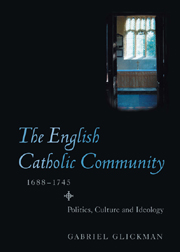Book contents
- Frontmatter
- Contents
- List of illustrations
- Acknowledgements
- Abbreviations
- Introduction
- 1 English Catholics and the Glorious Revolution of 1688
- 2 The making of the Catholic gentry in England and in exile
- 3 Conscience, politics and the exiled court: the creation of the Catholic Jacobite manifesto 1689–1718
- 4 Catholic politics in England 1688–1745
- 5 Unity, heresy and disillusionment: Christendom, Rome and the Catholic Jacobites
- 6 The English Catholic clergy and the creation of a Jacobite Church
- 7 The English Catholic reformers and the Jacobite diaspora
- Conclusion
- Appendices
- Bibliography
- Index
2 - The making of the Catholic gentry in England and in exile
Published online by Cambridge University Press: 12 September 2012
- Frontmatter
- Contents
- List of illustrations
- Acknowledgements
- Abbreviations
- Introduction
- 1 English Catholics and the Glorious Revolution of 1688
- 2 The making of the Catholic gentry in England and in exile
- 3 Conscience, politics and the exiled court: the creation of the Catholic Jacobite manifesto 1689–1718
- 4 Catholic politics in England 1688–1745
- 5 Unity, heresy and disillusionment: Christendom, Rome and the Catholic Jacobites
- 6 The English Catholic clergy and the creation of a Jacobite Church
- 7 The English Catholic reformers and the Jacobite diaspora
- Conclusion
- Appendices
- Bibliography
- Index
Summary
By 1691, when James II's forces withdrew from Ireland back to the continent, the Glorious Revolution had been established as a disruptive and traumatic moment for the Catholic community: a blow struck against the hope of peaceful integration into England. Despite the bursts of patriotic defiance with which they rallied around the Stuart banner, recusant leaders were forced to confront the creation of a new order far harder to negotiate, in which the utility of old political and intellectual resources appeared fatally undermined. Catholic religious and political writings after 1688 were not conceived in abstraction: they articulated the high stakes faced wherever the recusant world was strong enough to exert an identity, in a time when national allegiances had been overturned and the welfare of the flock cast into doubt. This chapter will look at how the social institutions of recusant England responded to the challenge, concentrating on the laymen who had assumed public leadership within the Catholic community, but had now become vulnerable to exile or imprisonment, after their reluctance to acknowledge the transference of the English crown. Outside the ranks of the clergy, the dominant voice in eighteenth-century Catholic writing remained that of the gentleman lay leader. Tracing the social fortunes of the recusant elites therefore lays a foundation to explore the way in which Catholics mediated between the contested national, political and religious identities that impinged upon their place in England after 1688.
- Type
- Chapter
- Information
- The English Catholic Community, 1688–1745Politics, Culture and Ideology, pp. 53 - 89Publisher: Boydell & BrewerPrint publication year: 2009



